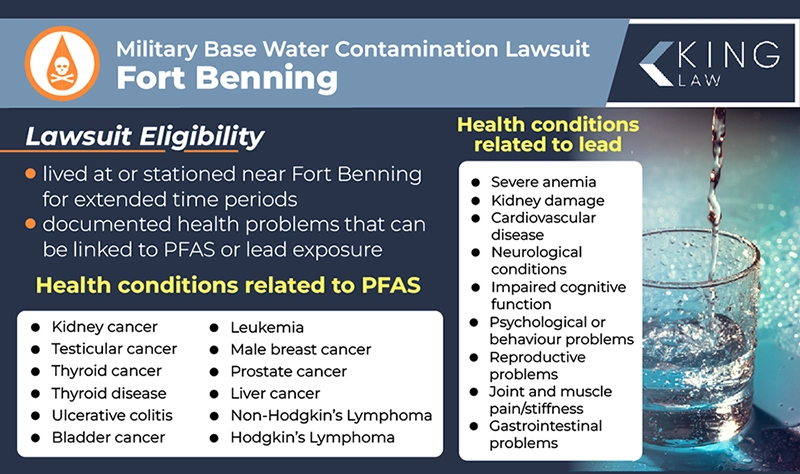
Fort Benning Water Contamination Lawsuit Overview
Fort Moore (formerly knows as Fort Benning, and before then Camp Benning) is a United States Army post located on Georgia’s border with Alabama. It was established in 1918 and currently hosts more than 120,000 active-duty military, family members, reserve soldiers and civilian employees on a daily basis.
The base is a hub from which forces can be deployed by air, rail and highway. Fort Benning also serves as a training post for officers, non-commissioned officers, airborne infantry, and basic Ranger school.
In 2023 the base was renamed Fort Moore.
Over the past several years, veterans and their families who lived or were stationed at Fort Benning have been raising concerns about potential health risks associated with exposure to contaminated drinking water due to polyfluoroalkyl substances (PFAS) and lead paint on base. These concerns have led to inquiries about the possibility of lawsuits and compensation.
Our law firm is currently evaluating cases where individuals have been diagnosed with:
- Kidney Cancer
- Testicular Cancer
- Bladder Cancer
- Thyroid Cancer
- Thyroid Disease
The ongoing military base water contamination case addresses PFAS water contamination on military bases all around the US. Veterans’ rights groups and personal injury lawyers are closely following the situation and offering legal consultations to potentially eligible individuals.
Fort Benning Water Contamination Lawsuit Updates – April 2024
March 8, 2023 – Military personnel, their families and civil employees that were stationed, lived or worked at Fort Benning can now file a water contamination lawsuit if they developed illnesses associated with PFAS or lead exposure. Reach out to King Law to see if you qualify.
February 8, 2023 – The court approved a $1.1 billion settlement with DuPont, resolving lawsuits related to water contamination caused by “forever chemicals.”
December 13, 2023 – PFAS were called “a true public health crisis”.
August 30, 2023 – Presence of PFAS confirmed on 455 military sites, including Fort Benning.
On this page:
Fort Benning Water Contamination Lawsuit Overview
Fort Benning Water Contamination Lawsuit Updates
History of Toxic Exposure at Fort Benning
Fort Benning Water Contamination Map
Contaminants Found in Fort Benning’s Drinking Water
Current Water Quality at Fort Benning
Health Risks Linked to Fort Benning’s Drinking Water
Eligibility Criteria for Fort Benning Water Contamination Lawsuit
Fort Benning Water Contamination Settlement and Payout Amounts
How to File a Fort Benning Water Contamination Lawsuit
History of Toxic Exposure at Fort Benning
Fort Benning, Georgia, has a history of toxic exposure incidents related to various environmental contaminants. These incidents have raised concerns about the safety of the drinking and bathing water available to military personnel, their families, civilian employees and neighboring communities.
In 2021 during unscheduled maintenance of the NCO Academy’s (Building 399) hot water system, water sampling and testing were conducted. Testing discovered elevated lead levels above the EPA action level.
Fort Benning authorities notified the occupants and provided them with bottled water.
Other concerns about potential water contamination at Fort Benning stem from the historical use of per- and polyfluoroalkyl substances (PFAS) in aquious firefighting foam (AFFF).
While the full extent of the potential contamination and its impact on Fort Benning residents and employees is still under investigation, there is some evidence suggesting elevated levels of PFAS in the water supply.
PFAS, known as “forever chemicals,” are linked to serious health effects, inluding various cancers. The U.S. military have used AFFF for over 50 years but have been replacing the older stocks with a new military specification (MILSPEC) foam that, according to experts, has significantly fewer health side effects.
Fort Benning Water Contamination Map

The map below details the extent of water contamination at the Fort Benning military base. The highlighted areas indicate where elevated levels of PFAS and lead were detected.
Additionally the Environmental Working Group (EWG) has created a national map of military installations with known or suspected PFAS contamination, which can be found on their official website.
Contaminants Found in Fort Benning’s Drinking Water
Analysis of water samples from Fort Benning has revealed the presence of various contaminants, including per- and polyfluoroalkyl substances (PFAS), lead, tallium, arsenic, and other harmful chemicals. These contaminants introduce serious health risks to those exposed to them over extended periods of time.
PFAS, particularly perfluorooctanoic acid (PFOA) and perfluorooctanesulfonic acid (PFOS), are the primary concern at Fort Benning.
PFAS: Per- and Polyfluorinated Substances
PFAS contamination mostly relates to the use of firefighting foam (AFFF) during training exercises that occurred at Fort Benning. These chemicals soak into the groundwater which contaminate the drinking water. Numerous studies have shown clear connections between PFAS and immune system dysfunction, hormonal disruptions, thyroid disease such as hyperthyroidism or hypothyroidism, ulcerative colitis, and multiple cancers including kidney cancer, testicular cancer, bladder cancer and thyroid cancer.
Lead Contamination
In 2018 Reuters investigated lead levels at Fort Benning, testing five homes. All five homes had dangerous levels of lead. The level in one home was 58 times the federal threshold. Further, medical data obtained by Reuters journalists showed that at least 31 children were found to have elevated lead levels at a Fort Benning Hospital within a 6-year interval.
Lead paint was found on other military bases as well, including West Point in New York and Fort Knox in Kentucky.
Lead poisoning can cause severe damage to children’s memory and cognitive skills, as well as trigger mental health and behavioral problems. According to the CDC, there is no such thing as a safe lead level in a child’s blood.
Current Water Quality at Fort Benning
Efforts to monitor and improve water quality at Fort Benning are ongoing, with measures in place to test and treat contaminated water sources. The Army performs annual water sampling with the next tests scheduled for March 2024.
However, concerns still remain about the effectiveness of these efforts in fully mitigating health risks associated with water contamination.
Water Treatment Efforts at Fort Benning
The Army has implemented various measures to address potential water contamination, including installing membrane filtration plants and ongoing monitoring to ensure compliance with safety standards.
However, the effectiveness of these measures in removing all PFAS from water remains a subject of debate.
Columbus Water Works (CWW), which supplies the water to Fort Moore (previously Fort Benning) is collaborating with the consulting and engineering firm Freese and Nichols, to find the best solutions to address PFAS water contamination at the base. In the initial stage, Freese and Nichols are evaluating PFAS treatment technologies and planning a pilot study to be conducted at the Fort Moore water treatment plant.
The study encompasses six different technology types, nine process streams, and samples from 18 different locations. Technologies under consideration for the pilot study include granular activated carbon, ion exchange, and reverse osmosis.
The project aims to improve drinking water quality but also serves as a foundation for large-scale research on innovative technologies, providing useful insights for water utilities (including at military bases) all over the United States facing similar issues to Fort Benning.
Health Risks Linked to Fort Benning’s Drinking Water
Exposure to contaminated drinking water at Fort Benning has been linked to various health problems, including increased risk of developing cancer, reproductive problems, liver disease, and other conditions.
Exposure to PFAS has been linked to various health problems, including:
- Kidney Cancer
- Testicular Cancer
- Thyroid Cancer
- Thyroid Disease
- Ulcerative Colitis
- Bladder Cancer
- Non-Hodgkin’s Lymphoma
- Hodgkin’s Lymphoma
- Leukemia
- Male Breast Cancer
- Prostate Cancer
- Liver Cancer
Exposure to lead is known to cause the following conditions:
- Neurological conditions
- Impaired cognitive function
- Psychological and behavioural problems
- Reproductive problems
- Severe anemia
- Kidney damage
- Cardiovascular disease
- Joint and muscle pain and stiffness
- Gastrointestinal problems
Our law firm is currently evaluating cases where individuals have been diagnosed with:
- Bladder Cancer
- Breast Cancer
- Hodgkin’s Lymphoma
- Kidney Cancer
- Leukemia
- Liver cancer
- Multiple-Myeloma
- Non-Hodgkin’s Lymphoma
- Pancreatic Cancer
- Prostate Cancer
- Testicular Cancer
- Thyroid Cancer
- Thyroid Disease
- Ulcerative Colitis
It’s important to mention that the severity of adverse health effects from lead exposure can vary depending on factors such as duration of exposure, individual susceptibility and age at the time of exposure.
Eligibility Criteria for Fort Benning Water Contamination Lawsuit
Individuals who lived or were stationed at Fort Benning during extended time periods and have documented health problems that can be linked to PFAS or lead exposure may be eligible to file a lawsuit and eventually be eligible for compensation. Our team can evaluate your individual situation which will help determine whether you should pursue legal action and how much your case may be worth.
1. Duration of exposure: Duration of exposure is an important factor in toxic exposure and water contamination lawsuits. While toxic exposure is never good, toxic chemicals like PFAS tend to build up in the body. We are typically looking for at least six months of exposure to a toxic substance.
2. Diagnosis: You must have a diagnosis connected to water contamination. Our firm has focused on claimants with kidney cancer, testicular cancer, bladder cancer, thyroid cancer, thyroid disease, and other illnesses listed below.
Our law firm is currently evaluating cases where individuals have been diagnosed with:
- Bladder Cancer
- Breast Cancer
- Hodgkin’s Lymphoma
- Kidney Cancer
- Leukemia
- Liver cancer
- Multiple-Myeloma
- Non-Hodgkin’s Lymphoma
- Pancreatic Cancer
- Prostate Cancer
- Testicular Cancer
- Thyroid Cancer
- Thyroid Disease
- Ulcerative Colitis
The more information you can provide related to your condition and your service, the better. Water contamination lawsuits may take several months or longer to resolve. An attorney can help guide you through the process so you know what to anticipate.

Fort Benning Water Contamination Settlement and Payout Amounts
Potential settlements or judgments are determined by the courts based on individual circumstances. It is difficult to predict what Fort Benning water contamination payout amounts may end up being, but our firm expects that most settlements will be between $30,000 and $500,000 with average settlements around $250,000.
If the Fort Benning Water Contamination lawsuit was to join a Multi-District Litigation (MDL) or Mass Tort Litigation (MTL) the payouts would depend on several factors, such as:
- Number of plaintiffs
- Severity of injuries
- Strength of the evidence
- Defendant’s financial resources
- Litigation costs
- Precedents (outcomes of similar cases)
How to File a Fort Benning Water Contamination Lawsuit
To file a lawsuit related to Fort Benning water contamination, one must seek legal advice from an experienced lawyer. At King Law our team of legal professionals can guide you through the legal process and help you build a strong case.
We would begin by evaluating if you’re eligible to file a claim. Then we would move on to gathering evidence, filing claims on your behalf, and potentially participating in litigation.
We accept cases nationwide.
Evidence Needed to Support Your Claim:
Evidence that you would need to gather includes:
- Military records proving residency or service at Fort Benning during relevant times
- Medical records documenting health conditions sustained
- Proof of water contamination at Fort Benning (such as water quality reports, witness testimonies, results of independent investigations and more)
Fort Benning Water Contamination Lawyers
To find the best water contamination lawyers, you may want to start by asking for referrals and researching reputable law firms. You may also want to look for lawyers with significant experience and expertise in handling water contamination cases. Be sure to evaluate their track record of success in similar cases.
King Law is currently offering consultations to potentially eligible individuals. Our personal injury lawyers have significant experience with water contamination lawsuits, including famous cases such as Camp Lejeune.
If you have been affected by water contamination at Fort Benning, we are here to provide you and your loved ones with legal guidance, strategy, support and representation.
Frequently Asked Questions (FAQs)
For additional information about Fort Benning water contamination, read additional questions and answers below.

